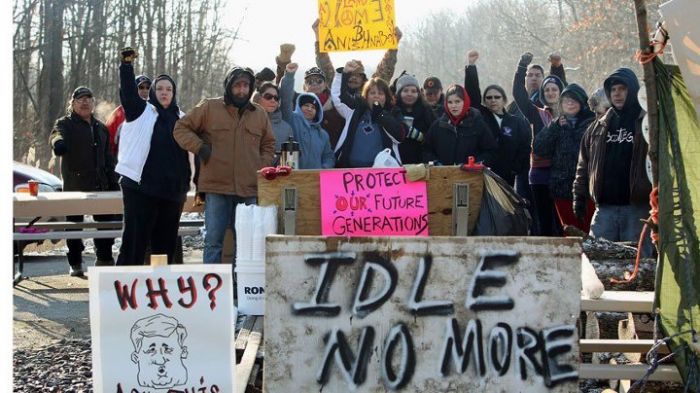Change the conversation, support rabble.ca today.
An Aamijiwnaag First Nation blockade of local CN rail tracks near Sarnia, Ontario, that began almost two weeks ago ended peacefully on Wednesday evening.
Sarnia and Ontario Provincial Police (OPP) gave the blockaders space to hold a victory feast and a closing ceremony for the Sacred Fire burning at the site. An elder smoked his pipe for a group of supporters in the early evening before people departed.
For thirteen days — with the natural progression of the thirteen moons — blockaders from Aamijiwnaag First Nation and their supporters held their blockade over a Canadian National (CN) St. Clair spur railway line which allows for the transportation of such chemicals such as propane to Eastern Canada.
After a series of community meetings, a meeting with band council — which came out against the blockade despite the support from the community — and court proceedings initiated by the propane industry, an Ontario judge ruled that the nearly two-week long First Nations blockade in Ontario must be dismantled at the discretion of the police on Wednesday, January 2.
Ron Plain, spokesperson for the blockade, called the blockade a “success,” because “much was accomplished.”
It set the tone, sent a message to Stephen Harper about the power and potential of action within the heart of First Nations communities across Canada.
The blockade was first established as part of the Idle No More movement, which has swept across the country like a forest on fire, aflame with resistance in support of Chief Theresa Spence and against Harper’s Bill C-45.
The Idle No More movement calls for a new relationship between First Nations communities and the Canadian government, a nation-to-nation relationship based on Treaty rights.
The current Conservative government has already passed the controversial omnibus Bill C-45, but there are currently eight bills that violate First Nation treaty rights and are meant to mimic the impact that the 1969 White Paper would have had on Indigenous communities across Canada.
Indigenous communities resisted the 1969 White Paper just as they are resisting C-45; just as they have always resisted colonization, attacks on their nations from the British, French and now the state of Canada.
No one can say that the Canadian state is on the side of First Nations communities when there are more than 600 missing and murdered Indigenous women within this country that are lacking basic justice from the police and the state. Calls for a national inquiry into the issue have continued to fall on deaf ears in Parliament. If it were more than 600 missing white women, there would have been an uproar across this country.
What kind of a country allows its own people, its original citizens, to die without even a whisper?
Poverty, homelessness, violence are the reasons why Idle No More “happened.”
First Nations, Metis and Inuit communities across Canada have never been and will never be idle; that was a stereotype created by the settler-powers-that-be as they conquered Canada. Indigenous communities have always been strong, across Canada and across the globe. Ours is a great fire.
Aamijiwnaag First Nation spokesperson Ron Plain started the CN rail blockade in support of Chief Theresa Spence, who is currently in her fourth week of a hunger strike at her teepee on Victoria Island in Ottawa (Algonquin traditional territory).
Conditions on Aamijhiwnaag First Nations territory have not received as much attention as the conditions in Attawapiskat, Ontario but the territory is known as “Chemical Valley,” the “most polluted place in North America.”
Within their borders, there are 63 petrochemical refineries which spew hundreds of millions of kilograms of pollutants into the air every year — which get breathed in by Indigenous and non-Indigenous lungs alike.
But the impact of the pollution is felt most severely within the reservation. One in every four people has asthma. There are two girls born for every boy because of endocrine disruption due to the chemical soup that is the air.
In truth, places like Attawapiskat — where Chief Spence is from — can be found across Canada. Another fire lit in resistance.
Indigenous author Leanne Simpson congratulated the blockaders, “Congratulations to everyone at the Aamjiwnaang Blockade. Your beautiful strength and inspiring commitment to our nation and the land has not gone unnoticed. Chi’miigwech!”
Krystalline Kraus is a regular blogger and correspondent for rabble.ca.




